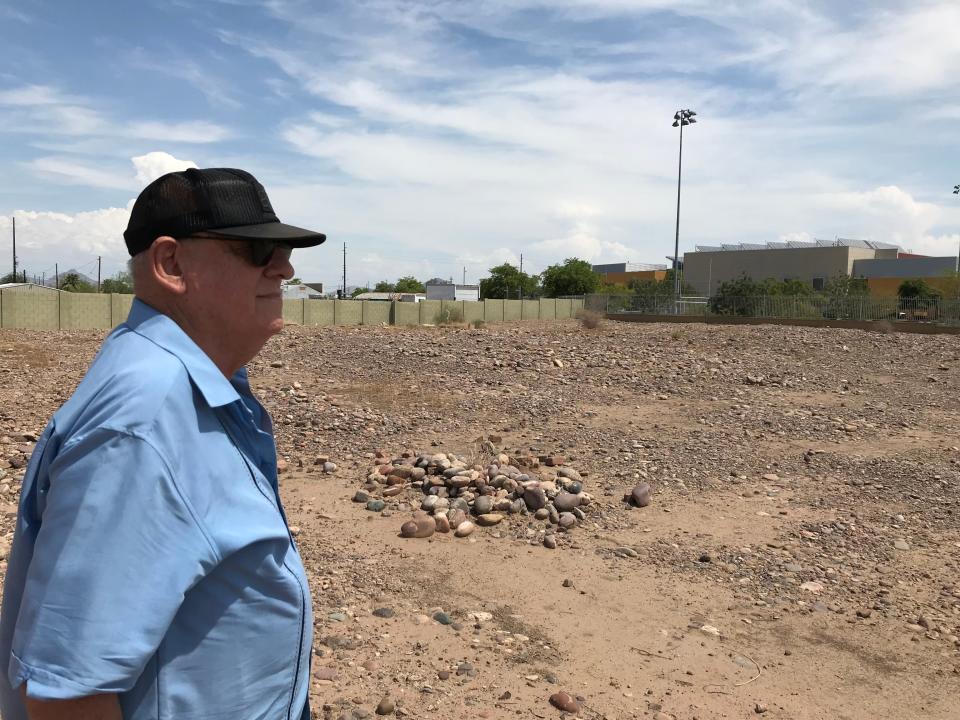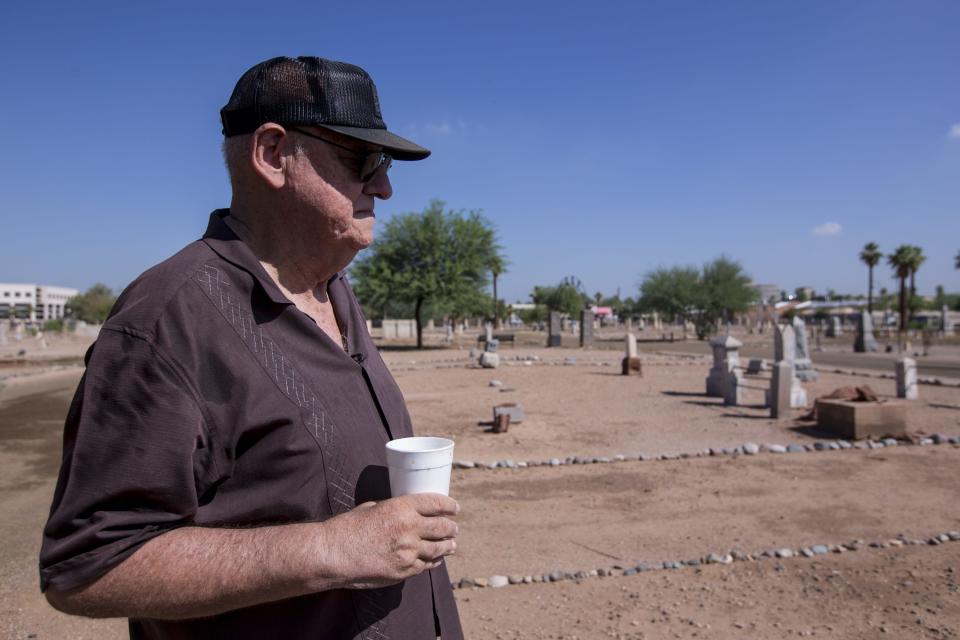Historian Frank Barrios, who fought Mexican American erasure in Phoenix, dies at 81
Corrections & Clarifications: An earlier version of this article had incorrect information about Frank Barrios' employment. He was a former state employee.
Lifelong Phoenix resident Frank Barrios, a champion of upholding the city’s Mexican American influence, died Monday afternoon at his home. He was 81.
The cause of death was a year-long bout with pancreatic cancer, according to his friend, historian Pete Dimas.
Barrios dedicated his life to promoting the history of the Mexican American experience in the Valley via preservation efforts he championed and a book he authored. Educated as a civil engineer, Barrios was a former state employee whose family traced its Arizona roots to the 19th century.
"Frank was not trained as a professional historian. He did it out of his heart," Dimas said in a Wednesday interview with The Arizona Republic. For Barrios, working as a historian "was a personal drive to make sure that the stories that dealt with the beginnings and the growth of Phoenix were not omitted."
It was most important for Barrios to spotlight the interest of the city’s Mexican American residents to earn an education and win political clout, Dimas said.
Fighting to prevent Mexican American erasure in Phoenix
Frank Martin Barrios was born on April 8, 1942, an only child to Alphonso Barrios, a native of Tecate, Baja California Norte, who served in World War II, and Dolores Gold Barrios, who was born and raised in the Valley. Frank was raised in the predominantly Latino neighborhood south of Roosevelt Street and east of Seventh Street in Phoenix.
In the mid- to late 2000s, Barrios sought restoration of the long-afflicted Sotelo-Heard Cemetery at 12th Street and Broadway Road. The historically Latino burial grounds had been vandalized and its upkeep ignored.
Barrios’ work researching history and archiving photographs culminated with the 2008 release of his Images of America book, "Mexicans in Phoenix." The book looked at Mexican Americans in the Valley from the 1860s through the community’s political activism in the 1970s.
Barrios’ maternal grandfather, Martin Gold, was a Yugoslavian immigrant and Arizona businessman who married into the Martinez family, which had been in the territory going back to the 1890s. Many of the photos and information featured in his book were from Barrios’ family collection, including the book’s cover image.
The now-defunct Phoenix Museum of History centered exclusively on "Anglo-Saxon pioneers," Barrios said in a 2008 interview with The Republic, adding that he strived to tell the stories of ethnic Mexicans who he argued built the city.
"They were very prominent here. They had a large presence here," Barrios said of Mexicans in Phoenix in the interview. "But history glossed over them. This is their history that has not been properly told."

Some of the photos Barrios archived were part of a temporary exhibit at the history museum, including a 1915 photo showing young Mexican Americans dressed in the Edwardian fashion of that period as they posed in front of Camelback Mountain’s Praying Monk formation.
"Most of the city’s history has been written by non-Hispanics, tending toward a certain point of view. Also, politics has been dominated by non-Hispanics, and much of what happens is told through those that make the laws," Barrios said in an interview with The Republic at the time, adding that Mexican Americans are "a subset of the American experience that are just as patriotic, just as strongly pro-American as any other group."
Expecting he would have little time before his death due to the typical short-term prognosis of pancreatic cancer, Barrios started working to ensure the rich history he had been collecting was not lost. Dimas said Barrios gathered historic photographs, written texts and oral histories in his possession and endowed these items to the Arizona Historical Society.
A history of community efforts in Arizona
Barrios earned his degree in 1966 from Arizona State University and worked in the U.S. Bureau of Reclamation in Phoenix before joining the Arizona Water Commission, according to an online obituary. He would become the commission’s manager when it was known as the Arizona Department of Water Resources, where he retired from in 1998.
"Most people who know Arizona's water history agree the state's sustainable growth has only been possible because of the tireless work of Frank Barrios and many others in the water community during that critical time of anticipated Arizona population growth," read the obituary.
He was a member of the League of United Latin American Citizens and ran unsuccessfully for election for the Central Arizona Water Conservation District in 2006 after a 2003 appointment to the board by Gov. Janet Napolitano.
From 2014 to 2017, Barrios was president of the St. Vincent De Paul charity in Phoenix.
"He was so kind and so humble and so generous with himself and his service to the poor," said his friend, Susan Junker, on Wednesday.
In that spirit, when Phoenix was considering budget cuts on senior centers, Barrios in a January 2009 article in The Republic said, "Consider the needy and the poor. Consider all options before making cuts."
Barrios enjoyed hiking and was a loyal fan of the Diamondbacks and Suns.

He is survived by several cousins.
A rosary service will be held from 5 p.m. to 7 p.m. on Sept. 20 at Whitney & Murphy Funeral Home at 4800 E. Indian School Road in Phoenix.
The funeral will be held at 9 a.m. on Sept. 21 at St. Francis Xavier Catholic Church at 4715 N. Central Avenue, with a gathering held after at the church grounds of Anderson Hall.
Reach breaking news reporter Jose R. Gonzalez at jose.gonzalez@gannett.com or on X, formerly Twitter @jrgzztx.
Support local journalism. Subscribe to azcentral.com today.
This article originally appeared on Arizona Republic: Historian for Phoenix's Mexican community, dies at 81

